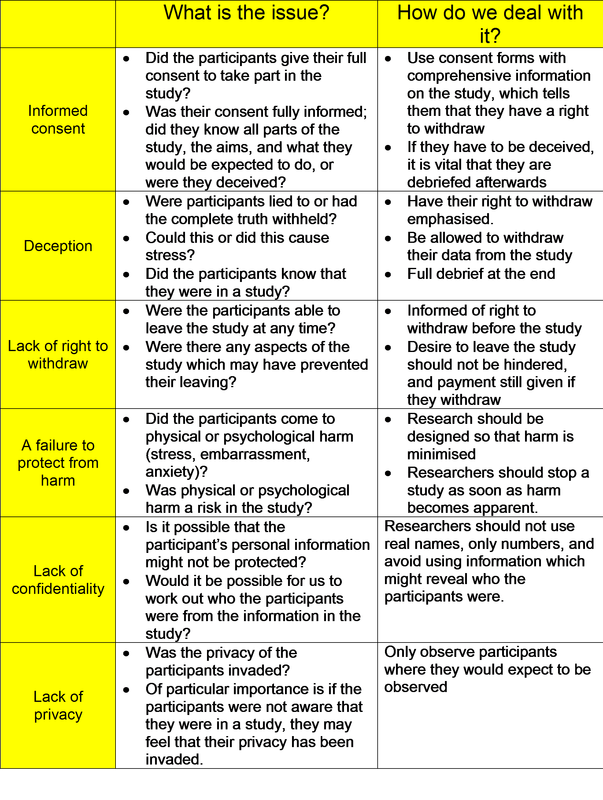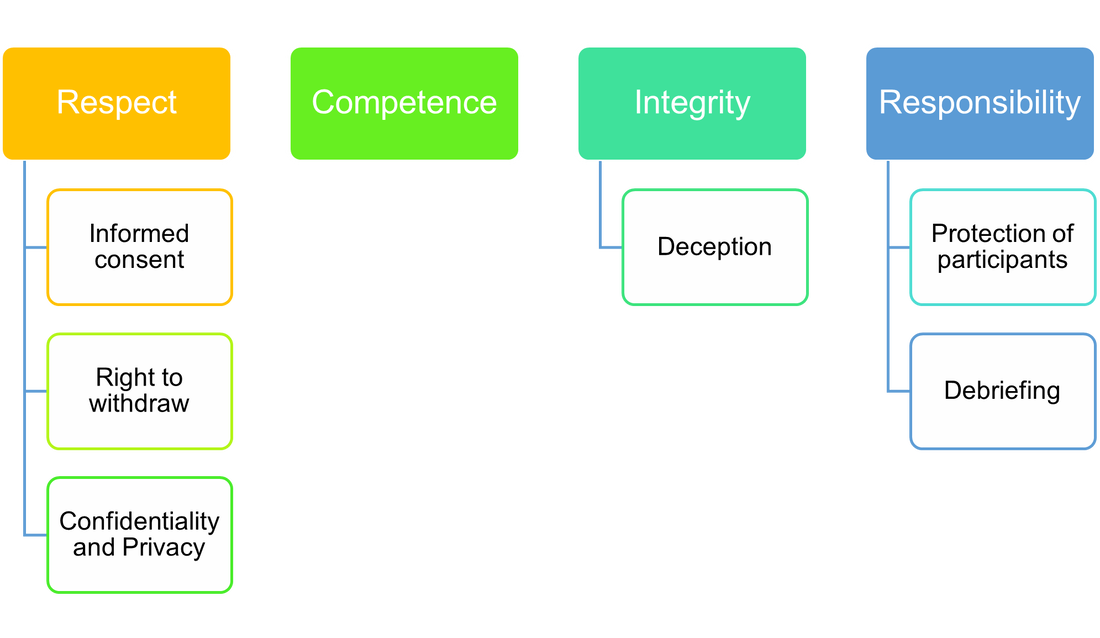The BPS's New 4 Principles

The British Psychological Society’s Code of Ethics and Conduct has 4 principles:
- Respect – informed consent, right to withdraw, confidentiality
- Competence
- Responsibility – protection of participant, debrief
- Integrity – deception
The four principles
Respect
Psychologists should respect individual, cultural and role differences, including (but not exclusively) those involving age, disability, education, ethnicity, gender, language, national origin, race, religion, sexual orientation, marital or family status and socio-economic status. They should also respect the knowledge, insight, experience and expertise of participants and members of the general public .and avoid practices that are unfair or prejudiced.
Competence
Psychologists value the continuing development and maintenance of high standards of competence in their professional work, and the importance of preserving their ability to function optimally within the recognised limits of their knowledge, skill, training, education, and experience. Psychologists should: Develop and maintain a comprehensive awareness of professional ethics, including familiarity with this Code, Integrate ethical considerations into their professional practices as an element of continuing professional development. Recognise that ethical dilemmas will inevitably arise in the course of professional practice and accept their responsibility to attempt to resolve such dilemmas.
Responsibility
Psychologists value their responsibilities to the general public, and to the profession and science of psychology, including the avoidance of harm and the prevention of misuse or abuse of their contributions to society.
Integrity
Psychologists value honesty, accuracy, clarity, and fairness in their interactions with all persons, and seek to promote integrity in all facets of their scientific and professional endeavours.
Respect
Psychologists should respect individual, cultural and role differences, including (but not exclusively) those involving age, disability, education, ethnicity, gender, language, national origin, race, religion, sexual orientation, marital or family status and socio-economic status. They should also respect the knowledge, insight, experience and expertise of participants and members of the general public .and avoid practices that are unfair or prejudiced.
Competence
Psychologists value the continuing development and maintenance of high standards of competence in their professional work, and the importance of preserving their ability to function optimally within the recognised limits of their knowledge, skill, training, education, and experience. Psychologists should: Develop and maintain a comprehensive awareness of professional ethics, including familiarity with this Code, Integrate ethical considerations into their professional practices as an element of continuing professional development. Recognise that ethical dilemmas will inevitably arise in the course of professional practice and accept their responsibility to attempt to resolve such dilemmas.
Responsibility
Psychologists value their responsibilities to the general public, and to the profession and science of psychology, including the avoidance of harm and the prevention of misuse or abuse of their contributions to society.
Integrity
Psychologists value honesty, accuracy, clarity, and fairness in their interactions with all persons, and seek to promote integrity in all facets of their scientific and professional endeavours.
The Old Ethical Guidelines

The old ethical guidelines are:
Informed Consent
Participants should be told the nature, purpose, and anticipated consequences of any research participation, and ideally the researcher should gain informed consent at the beginning of research. If participants are under the age of 16, consent needs to be gained from parents or guardians.
Right to withdraw
Investigators should make clear to participants their right to withdraw from the investigation at any time irrespective of payment or other inducement. If a participant withdraws they have the right to demand their own data and recordings to be destroyed.
Privacy and Confidentiality
Participants privacy should be respected and in the case of observations research you should only expect to be observed in a ‘public place’. All results or information gathered relating to specific individuals must be kept confidential. Names or details of participants should not be released. Participants should be made aware where any breech of confidentially may occur.
Protection of Participants
Researchers must not cause any physical or psychological harm to participants. They should leave a study in the same state that they entered.
Deception
Intentional deception such as lying to participants, misleading them about the aims or other aspects involved must be avoided as much as possible unless deception is necessary in exceptional circumstances to preserve the integrity of research.
Debriefing
A way to overcome breaking ethical guidelines after a piece of unethical research has been conducted is to debrief your participants. This is done at the end of the study, it is the researchers’ responsibility to provide participants with any necessary information they need to complete their understanding of the study and check that participants have not suffered any harm psychological or physical harm. If the participants had been deceived in any way or consent not gained the researchers should fully explain the true purpose.
The cost benefit analysis
Psychologists must ‘weigh up’ the benefits to society that may be gained by testing new theories and the costs to the participants within the research. This may often produce conflict about treating the participants ethically. For example, if informed consent is obtained and no deception is used in the study the participants are being treated ethically BUT they are not naïve so this could affect the results of the study.
Informed Consent
Participants should be told the nature, purpose, and anticipated consequences of any research participation, and ideally the researcher should gain informed consent at the beginning of research. If participants are under the age of 16, consent needs to be gained from parents or guardians.
Right to withdraw
Investigators should make clear to participants their right to withdraw from the investigation at any time irrespective of payment or other inducement. If a participant withdraws they have the right to demand their own data and recordings to be destroyed.
Privacy and Confidentiality
Participants privacy should be respected and in the case of observations research you should only expect to be observed in a ‘public place’. All results or information gathered relating to specific individuals must be kept confidential. Names or details of participants should not be released. Participants should be made aware where any breech of confidentially may occur.
Protection of Participants
Researchers must not cause any physical or psychological harm to participants. They should leave a study in the same state that they entered.
Deception
Intentional deception such as lying to participants, misleading them about the aims or other aspects involved must be avoided as much as possible unless deception is necessary in exceptional circumstances to preserve the integrity of research.
Debriefing
A way to overcome breaking ethical guidelines after a piece of unethical research has been conducted is to debrief your participants. This is done at the end of the study, it is the researchers’ responsibility to provide participants with any necessary information they need to complete their understanding of the study and check that participants have not suffered any harm psychological or physical harm. If the participants had been deceived in any way or consent not gained the researchers should fully explain the true purpose.
The cost benefit analysis
Psychologists must ‘weigh up’ the benefits to society that may be gained by testing new theories and the costs to the participants within the research. This may often produce conflict about treating the participants ethically. For example, if informed consent is obtained and no deception is used in the study the participants are being treated ethically BUT they are not naïve so this could affect the results of the study.




